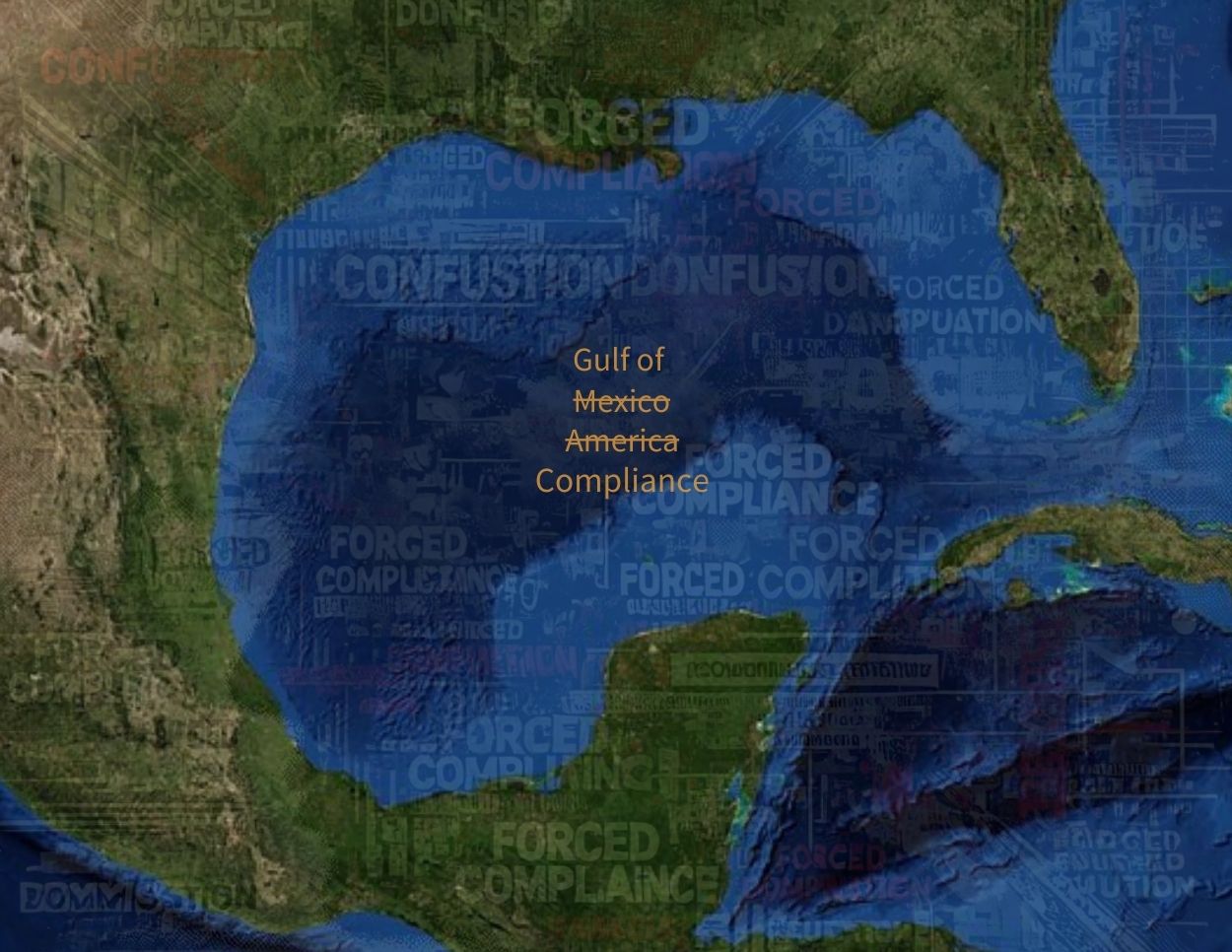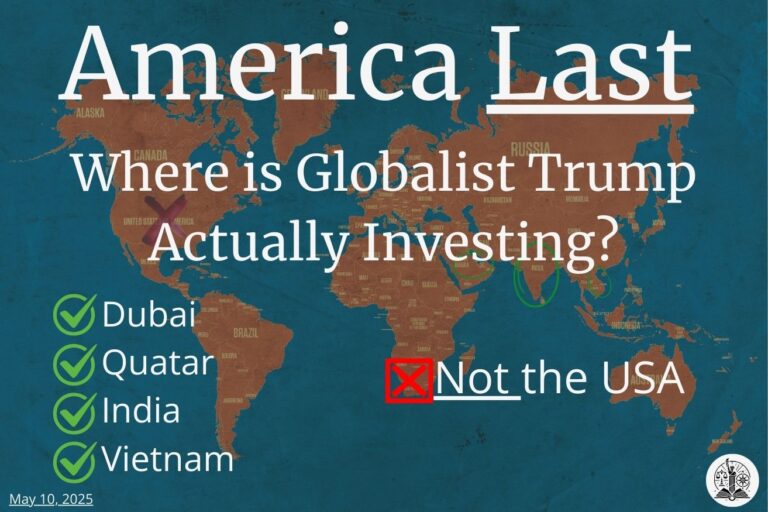The Gulf of America Test – What I Predicted, What’s Happening, and the Psychology of Compliance
Update: The White House Escalates Its Attack on the Associated Press (February 14, 2025)
What began as a single reporter being barred from an event has now escalated into a full-scale ban. The White House has indefinitely revoked the Associated Press’ access to presidential events, including Oval Office briefings and Air Force One travel, over its refusal to adopt the term “Gulf of America.”
White House Deputy Chief of Staff Taylor Budowich took the attack even further, claiming AP’s insistence on using “Gulf of Mexico” was not only defiant but “misinformation.” (The Wrap) This move signals something much deeper than a language dispute—it is a warning to the entire press corps.
A Rapidly Escalating Attack on the Free Press
This is no longer just a test of compliance; it is an overt attempt to delegitimize any media that does not conform to government-mandated language. The administration is framing factual reporting as misinformation, setting the stage for even more aggressive censorship and control.
This escalation is a harbinger of what’s to come. If the White House can blacklist one of the most prominent news organizations in the world for refusing to change a name, what will stop them from going further? This is not just about the AP—it is about setting a precedent.
The question now is: Who will comply, and who will resist?
The below was originally published on February 13th, 2025.
tl;dr:
The White House just barred an AP reporter from an event for refusing to call it the “Gulf of America” instead of the “Gulf of Mexico.” This isn’t just about a name—it’s about control. When the government can dictate language, it forces compliance, turning words into political loyalty tests. Businesses, schools, and even everyday conversations are already feeling the pressure to fall in line.
I predicted this weeks ago. Media outlets are choosing sides, federal agencies are updating documents, and corporations like BP and Chevron are already using the new term. Some states are even pushing schools to adopt it. What starts as a minor language change quickly becomes an enforced reality—one that punishes those who refuse to comply.
This isn’t just political posturing—it’s a test. If people accept this, what else can be rewritten? At what point does resistance become more exhausting than compliance? The answer to those questions will shape what comes next.
The Executive Order & Initial Prediction
On January 20, 2025, President Donald Trump signed a series of executive orders, one of which renamed the Gulf of Mexico to the Gulf of America. The executive order mandated that all federal agencies, maps, and official communications use the new name. It also instructed the U.S. Board on Geographic Names to update its records accordingly.
The Gulf of Mexico has been recognized under that name for over 400 years, appearing in international treaties, historical records, scientific research, and global maps. It is one of the most well-known geographic names in the Western Hemisphere. The sudden renaming, imposed unilaterally by executive order, was immediately met with skepticism, confusion, and controversy.
At first glance, this move seemed absurd or even laughable—a petty rebranding exercise with little real-world consequence. Why rename a body of water that has been globally recognized for centuries? However, as we analyzed the decision, it became clear that this was not merely a symbolic gesture.
Our January 21st Prediction: A Loyalty Test in Disguise
I argued that this was not about geography—but about power. The renaming of the Gulf of Mexico was designed to function as a loyalty test, a means of enforcing ideological compliance, and a way to identify and marginalize opposition. This order was about more than maps; it was about conditioning the population to accept political control over language and reality itself.
These predictions included the following:
- Government employees, including federal agencies and the military, would be required to use “Gulf of America” in all official documentation, internal reports, and communications. Non-compliance would be viewed as an act of defiance.
- Federal contractors and corporations working with the government would be pressured to adopt the new terminology to maintain contracts and avoid political scrutiny.
- Media outlets would be forced to decide whether to comply—those that continued using “Gulf of Mexico” would risk losing access to government sources and press briefings.
- Schools, particularly in Republican-led states, would be expected to follow suit by integrating “Gulf of America” into curricula, lesson plans, and educational materials.
- The name change would bleed into social interactions, creating a new form of political sorting—saying “Gulf of America” would indicate loyalty, while using “Gulf of Mexico” would mark someone as resistant to Trump’s authority.
If people accepted this shift without resistance, it would set a dangerous precedent—demonstrating that language, history, and reality itself could be redefined at the will of political power.
Now, less than a month later, we are already seeing those predictions unfold.
What I Predicted—and What Has Already Happened
In the initial analysis, I argued that Trump’s executive order renaming the Gulf of Mexico to the Gulf of America was not just a symbolic rebranding but a political loyalty test designed to sort compliance from resistance.
I predicted that this shift in language would not remain confined to official government use but would ripple outward—into federal agencies, businesses, media, schools, and even everyday conversations. Over time, we warned, enforcement mechanisms would emerge, pushing both institutions and individuals to conform or face consequences.
Less than a month later, those predictions are unfolding in real time.
1. Media and Public Discourse: The Litmus Test Becomes Reality
Prediction: I predicted that the name change would become a political marker, signaling whether individuals and institutions were aligned with the Trump administration. We anticipated that media outlets would be forced to choose sides, with some adopting the new terminology and others resisting—risking access to government sources if they refused to comply.
Reality: That battle is already playing out in the press.
- Fox News and other right-wing outlets have fully adopted “Gulf of America” in their reporting, treating it as an established fact rather than a recent political change.
- The Associated Press (AP), Reuters, and The New York Times continue using “Gulf of Mexico,” which has led to backlash from administration officials and right-wing commentators.
- An AP reporter was barred from a White House event after refusing to use “Gulf of America” in an official press briefing. This marks the first documented case of access being denied due to noncompliance with the name change. (Source: AP News)
- Conservative commentators have begun framing noncompliance as evidence of anti-Trump bias. Media personalities on Newsmax and OAN have attacked outlets still using “Gulf of Mexico,” suggesting that they are engaging in “revisionist geography” to defy Trump.
What was once a neutral geographic term is now a political wedge issue. The question of which name a person or organization uses now signals political allegiance, further fueling polarization in media and everyday conversations.
2. Corporate Adaptation: Companies Move to Align
Prediction: I argued that businesses—especially those with federal contracts—would be pressured into adopting the new terminology to maintain good standing with the government. Over time, we expected this shift to extend beyond companies directly tied to federal work, spilling into the private sector as corporations sought to avoid controversy and government scrutiny.
Reality: That shift has already begun.
- BP and Chevron have started referring to the 2010 Deepwater Horizon disaster as the “Gulf of America oil spill.” This shift, noted in recent corporate communications, suggests that companies with a financial stake in the region are preemptively adjusting their language. (Source: The Times)
- Google Maps updated the name in its U.S. version, though internationally, the label still appears as “Gulf of Mexico.” This dual labeling strategy may reflect a corporate attempt to navigate conflicting geopolitical pressures.
- Federal contractors, particularly those in defense and energy, have quietly begun adjusting their language in internal documents. Sources from within major firms have noted that their legal teams are reviewing contracts to ensure compliance with federal naming conventions.
While no formal mandate has been issued requiring corporations to use the term, the shift is already happening organically—driven by a mix of political pressure and corporate risk aversion.
Companies appear to be hedging their bets, preparing for a reality where federal contracts and access to government resources may depend on linguistic alignment.
3. Schools and Teachers: Pressure Mounts in Education
Prediction: I expected that Republican-led states would introduce legislation requiring schools to teach “Gulf of America” instead of “Gulf of Mexico.” We also predicted that teachers who refused to comply could face professional consequences, as language in the classroom became another battleground for ideological enforcement.
Reality: State-level action is already in motion.
- Iowa legislators have introduced a bill requiring that all school materials be updated to use “Gulf of America.” The proposed legislation also mandates that public school educators refer to the body of water by its new name in all classroom instruction. (Source: Des Moines Register)
- Teachers are facing pressure from parents and administrators over how they refer to the Gulf in class. Some have already begun self-censoring to avoid conflict, even in states where no formal mandate has been passed.
- A high school in New Jersey faced controversy when teachers wore “Gulf of America” T-shirts, prompting backlash from students and parents, particularly in predominantly Latino communities.
Though enforcement is still in its early stages, the education system is becoming another site of forced compliance.
4. Governmental Compliance: Federal Agencies Fall in Line
Prediction: I anticipated that federal agencies would be required to adopt the new terminology, with employees expected to use “Gulf of America” in reports, internal communications, and public statements. Non-compliance would be seen as defiance, subtly or overtly affecting career prospects.
Reality: That process is already well underway.
- The U.S. Department of the Interior has begun updating official records and internal documents to reflect the change. The agency’s latest geographical reports now only use “Gulf of America” in all references to the region. (Source: Department of the Interior)
- White House staffers have been instructed to use “Gulf of America” exclusively in press releases and official statements.
- Military branches have begun phasing in the new terminology in briefing documents and internal communications, although sources report some quiet resistance among rank-and-file personnel.
While there have been no confirmed firings yet, several sources within federal agencies have noted pressure to comply and a clear expectation that employees avoid using “Gulf of Mexico” in professional settings.
The Patterns Are Clear
From media to corporations, schools to government agencies, the shift is already happening—without the need for explicit legal mandates.
What does this reveal about how language is used as a mechanism of control?
Is this simply about renaming a body of water, or is this a broader experiment in shaping public compliance through enforced linguistic shifts?
As institutions and individuals fall in line, how will this shape future tests of political loyalty, reality, and control?
The Psychology of Forced Compliance
The renaming of the Gulf of Mexico to the Gulf of America is not just about geography—it is an exercise in control, testing how easily individuals and institutions can be compelled to conform to a dictated reality. Whether or not people believe in the validity of the name change is secondary to whether they comply.
This phenomenon aligns with well-documented psychological theories on forced compliance, cognitive dissonance, and group conformity. History and behavioral science suggest that once people are pressured into repeating something they do not believe, they either resist and face consequences or, more often, rationalize their compliance. Over time, the new terminology becomes normalized, and resistance fades.
1. The Cognitive Dissonance of Forced Language
When people are made to say something they do not believe—whether under threat of consequences or social pressure—they experience cognitive dissonance. This psychological discomfort arises when a person’s internal beliefs conflict with their outward behavior.
- If an individual is repeatedly required to use “Gulf of America” instead of “Gulf of Mexico” in work settings, legal documents, or social interactions, it creates an internal contradiction.
- The longer this forced compliance continues, the more difficult it becomes to maintain the belief that the change is illegitimate without feeling psychological strain.
- To relieve this discomfort, many people subconsciously adjust their beliefs to align with their actions—leading to a gradual, often unnoticed acceptance of the new reality.
This is a well-documented effect in behavioral psychology. Studies on forced compliance theory, first demonstrated by Leon Festinger and James Carlsmith, show that when people are coerced into a position through external pressure, they often alter their internal attitudes to reduce discomfort.
- In a landmark 1959 study, participants were asked to perform a dull task and then lie to others about how enjoyable it was.
- Those who were paid only a small amount to lie actually convinced themselves that the task was more enjoyable than those who were given a larger incentive.
- The takeaway: when people are forced into saying something they do not initially believe, they often end up believing it over time.
The same principle applies here. Even those who initially resist calling it the “Gulf of America” may, over time, begin using the term reflexively. At a certain point, the repetition dulls the resistance, and what was once unthinkable becomes routine.
Source: Forced Compliance Theory
2. The Asch Conformity Experiments: When the Majority Shapes Perception
Another key psychological mechanism at play is social conformity, first studied in depth by psychologist Solomon Asch in the 1950s. His famous Asch conformity experiments revealed how people will often abandon their own perceptions and conform to the group, even when the group is clearly wrong.
- In these experiments, participants were asked to identify which of three lines matched a reference line in length.
- When participants were alone, nearly everyone answered correctly.
- However, when they were placed in a group where others intentionally gave the wrong answer, many participants began agreeing with the incorrect majority—even when they knew it was wrong.
The lesson from Asch’s research is that people fear standing out as the only dissenter, even on something as simple as visual perception. When it comes to language and political control, the effect is even stronger.
- If the media, government agencies, corporations, and social circles all start using “Gulf of America” as though it is an uncontested reality, people will experience intense pressure to conform, even if they personally reject the change.
- Eventually, hearing the phrase enough times will make it seem normal, and saying “Gulf of Mexico” will start to feel like an unnecessary act of defiance.
At a societal level, this is how controlled language becomes normalized—not necessarily through direct coercion, but through social pressure and fear of standing out.
Source: Asch Conformity Experiments
3. How Language Manipulation Shapes Reality
The forced adoption of new terminology is not just about control; it is about redefining how people think and talk about the world itself. The more a term is used, the more it cements itself in the collective understanding of reality.
This process has been observed in totalitarian regimes throughout history. Orwell’s Newspeak in 1984 was based on the idea that controlling language ultimately controls thought—if people lack the words to express resistance, they eventually lose the ability to even think of resisting.
- In Stalinist Russia, the names of cities, institutions, and even historical figures were constantly rewritten to reflect ideological shifts. Tsarist-era city names were removed, and places were renamed to glorify Communist leaders, such as St. Petersburg becoming Leningrad and Tsaritsyn becoming Stalingrad. After Stalin’s death, de-Stalinization efforts reversed many of these changes.
- In N–i Germany, the regime renamed cities and institutions to align with its ideology. Streets, schools, and landmarks were frequently renamed after Hitler and other high-ranking officials. Places with Jewish, Slavic, or other “undesirable” names were erased. After the war, these names were reversed, showing how political control over language can be undone when regimes fall.
- In Maoist China, politically incorrect terms were erased from textbooks, and people were required to use only state-approved vocabulary to discuss political events. The Cultural Revolution saw an aggressive push to rename institutions and landmarks to fit the Communist Party’s ideological narrative, reinforcing state control over historical memory.
- In modern authoritarian states, leaders have understood that forcing people to adopt their preferred language is one of the first steps toward ensuring compliance. Russia has selectively reintroduced Soviet-era names and terminology, while Turkey, India, and Hungary have used renaming to assert nationalist or ideological dominance over historical narratives.
By forcing people to say “Gulf of America” rather than “Gulf of Mexico,” the Trump administration is not just testing obedience—it is shifting the baseline of reality itself. The more people repeat the term, the harder it becomes to challenge it.
Source: George Orwell’s 1984 and the Politics of Language
4. The Normalization of Compliance
If people comply with this shift in language now, future ideological demands will become easier to enforce.
- Today, it is simply a name on a map.
- Tomorrow, it may be the accepted terminology in legal documents, textbooks, and contracts.
- Eventually, the original term may disappear entirely, and calling it the “Gulf of Mexico” could be seen as a political act of defiance.
The end result is not just a shift in vocabulary but a shift in thought. The more people are compelled to comply with something they instinctively reject, the easier it becomes for the next act of compliance to follow.
This is how ideological shifts are introduced—not through explicit legal enforcement alone, but through language, repetition, and social pressure.
The Questions That Arise
How long will it take before “Gulf of America” sounds normal to those who once rejected it?
At what point does resistance to using the term become more exhausting than simply accepting it?
And once that threshold is crossed, what other linguistic and behavioral shifts might follow?
The psychology of forced compliance suggests that once this process begins, it rarely stops at a single demand.
The True Purpose of This Renaming Effort
The renaming of the Gulf of Mexico to the Gulf of America is not about geography. It is about control. This executive order has served as a test to see how easily language can be reshaped by political authority and how effectively institutions and individuals can be pressured into compliance.
In just a few weeks, the shift has already begun taking hold. Media outlets are choosing sides. Federal agencies and government employees are adjusting their terminology. Corporations with ties to the federal government are aligning their language with the new directive. Schools are starting to feel pressure to integrate the change, with legislation already in motion to formalize it in state curriculums. Even in everyday conversations, people are beginning to notice who says “Gulf of America” and who refuses to.
The speed of this transformation raises important questions. How many people truly believe that this renaming is justified, and how many are simply complying to avoid conflict? At what point does resistance to using the term become more exhausting than simply accepting it? If this renaming takes hold without meaningful opposition, what will that signal about the future of linguistic and ideological enforcement?
History has shown that once people begin conforming to a new imposed reality, future shifts become easier to implement. Language is one of the most effective tools for shaping thought, and those who control the terms of discussion ultimately influence how people perceive history, politics, and even their own beliefs. The question now is whether this renaming effort is an isolated case, or if it is the beginning of a broader attempt to dictate public compliance through control of language.
Sources Include
- Department of the Interior:
https://www.doi.gov/pressreleases/interior-department-advances-restoration-historic-names-honoring-american-greatness - Associated Press (AP) on Media Compliance:
https://apnews.com/article/3f43c519a4b4f4661dd0831421943ef7 - The Times on Corporate Compliance (BP and Chevron):
https://www.thetimes.co.uk/article/bps-gulf-rebrand-spills-over-into-deepwater-horizon-disaster-qnls6x5l7 - Des Moines Register on Iowa’s School Curriculum Bill:
https://www.desmoinesregister.com/story/news/politics/2025/02/03/bill-iowa-legislature-school-materials-must-refer-gulf-of-america-mount-mckinley-denali/78184609007 - Forced Compliance Theory – Wikipedia:
https://en.wikipedia.org/wiki/Forced_compliance_theory - Asch Conformity Experiments – Wikipedia:
https://en.wikipedia.org/wiki/Asch_conformity_experiments - George Orwell’s 1984 and the Politics of Language – Wikipedia:
https://en.wikipedia.org/wiki/Newspeak







